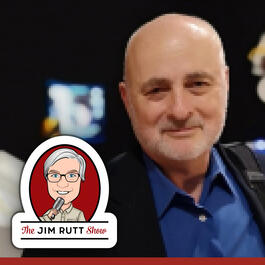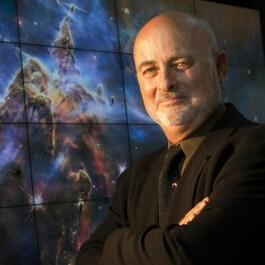
EP15 Futurist David Brin on The Case for Optimism
David Brin is best-known for shining light — plausibly and entertainingly — on technology, society, and countless challenges confronting our rambunctious civilization. His bestselling novels include The Postman (filmed in 1997) plus explorations of our near-future in Earth and Existence. Other novels are translated into over 25 languages. His short stories explore vividly speculative ideas. Brin's nonfiction book The Transparent Society won the American Library Association's Freedom of Speech Award for exploring 21st century concerns about security, secrecy, accountability and privacy. As a scientist, tech-consultant and world-known author, he speaks, advises, and writes widely on topics from national defense and homeland security to astronomy and space exploration, SETI and nanotechnology, future/prediction, creativity, and philanthropy. Urban Developer Magazine named him one of four World's Best Futurists, and he was cited as one of the top 10 writers the AI elite follow. Introduction to David Brin and The Case for Optimism 20 minutes Is the World Improving? Zero Sum vs. Positive Sum 12 minutes Ritualized Combat in Science, Sports, Markets, Courts, Democracy 14 minutes "The Transparent Society" + The Surveillance Society 20 minutes The Fermi Paradox or "The Great Silence" + Uplift 7 minutes SETI, METI, NASA, NIAC + The Drake Equation 11 minutes Transcripts for The Jim Rutt Show featuring David Brin Keynames for EP15: Jim Rutt, David Brin, "The Postman", "The Transparent Society", "Existence", "Earth", "Chasing Shadows", "Elevation", "Star Wars on Trial", "The Loom of Thessaly", "Uplift War", Santa Fe Institute, Hugo Award, Nebula Award, Arnold J. Toynbee, Matthew Woodring Stover, Karl Popper, "The Open Society and Its Enemies", Adam Smith, "The Wealth of Nations", "The Theory of Moral Sentiments", Karl Marx, Franklin Delano Roosevelt, Newt Gingrich, Dennis Hastert, Bill Clinton, Steven Pinker, Peter Diamandis, XPRIZE, Dean Kamen, Elon Musk, Jeff Bezos, NASA, Fox News, Donald Trump, Junker, Republican Party, Democratic Party, Facebook, Gutenberg, Mark Zuckerberg, Paul Tsongas, Warren Rudman, Martin Luther King Jr., Bull Connor, China, Estonia, Charlie Brooker, "Black Mirror", Contrary Brin, davidbrin.blogspot.com, Electronic Frontier Foundation, EFF, American Civil Liberties Union, ACLU, Sierra Club, Robin Hanson, "The Circle", Enrico Fermi, Jill Tarter, SETI, Nick Bostrom, METI, Liu Cixin, "The Three-Body Problem", Frank Drake, Douglas Vakoch, Joe Norman, NASA Innovative and Advanced Concepts, NIAC Keywords for EP15: Jim Rutt, David Brin, science fiction, SciFi, artificial intelligence, AI, optimism, Hollywood, propaganda, Star Trek, Star Wars, Captain Kirk, competition, evolution, progress, cheating, rules, umpires, regulated capitalism, intense regulation, oligarchy, supply side, zero sum, positive sum, consumer surplus, abundance, XPRIZE, innovation, competition vs. cooperation, media evolution, ritualized combat, sensemaking, attention economy, Tea Party, feudalism, slavery, emancipation, land redistribution, entitlements, surveillance, law enforcement cameras, social credit, snitching, "sousveillance", facial recognition, radical transparency, The Enlightenment Experiment, The Fermi Paradox, The Drake Equation, extraterrestrial, aliens, The Precautionary Principle, extremophiles, space colonization, NIAC grants
From "The Jim Rutt Show"




Comments
Add comment Feedback